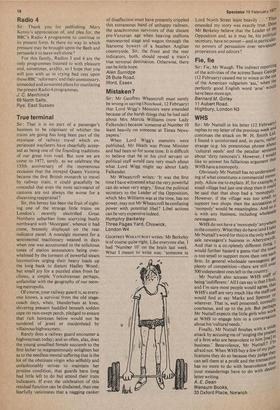True terminal •
Sir: That it is no part of a passenger's business to be cognisant of whither the trains are going has long been part of the mystique of railway travel which experienced wayfarers have cheerfully accepted as being one of the founding traditions of our great iron road. But now we are come to 1977, surely, as we celebrate the 135th anniversary of the momentous occasion that the intrepid Queen Victoria became the first British monarch to travel by railway train, it could gracefully be conceded that even the most sacrosanct of customs are not always the worse for a discerning reappraisal ?
Sir, this heresy has been the fruit of sighting one of the strange little trains on London's recently electrified Great Northern suburban lines scurrying busily northward with 'Moorgate', whence it had come, brazenly displayed on the rear indicator panel. A nostalgic moment for a sentimental reactionary weaned in days when one was accustomed to the solicitous tones of station announcers being overwhelmed by the torment of powerful steam locomotives urging their heavy loads up the long bank to distant Hadley Wood; but small joy for a puzzled alien from far climes, a simple Yorkshireman perhaps, unfamiliar with the geography of our teeming metropolis.
. Of course, your railway guard is, as everyone knows, a survival from the old stagecoach days, when, blunderbuss at knee, shivering peasant huddled beneath sodden cape on rain-swept perch, pledged to ensure that rich heiresses below would not be sundered of jewel or maidenhead by villainous highwaymen.
Rarely does a railway guard encounter a highwayman today; and so often, alas, does the young unsullied female succumb to the first lecher to magnanimously enlighten her as to the needless mental suffering that is the lot of the obstinate virgin who selfishly and unfashionably strives to maintain her pristine condition, that guards have long had little left to do but attend their train indicators. If even the celebration of this residual function can be disdained, then one fearfully vaticinates that a nagging canker of disaffection must have presently crippled this extraneous band of unhappy railmen, the anachronous survivors of that distant pre-Victorian age when heaving stallions manoeuvred stage and wagon through the fearsome byways of a heathen Anglian countryside. Sir, the front and the rear indicators, both, should reveal a train's true terminal destination. Otherwise, there can be little hope.
Alan Surridge 28 Bute Road, Ilford, Essex


































 Previous page
Previous page